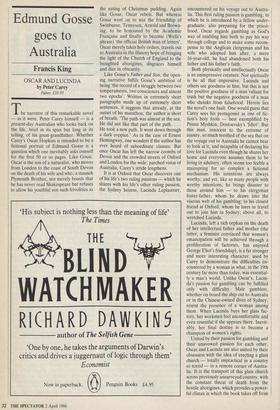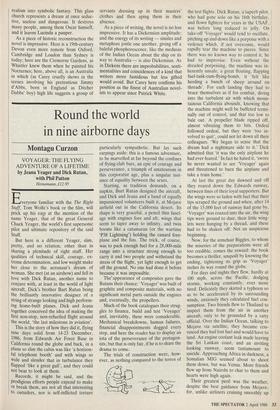Edmund Gosse goes to Australia
Francis King
OSCAR AND LUCINDA by Peter Carey
Faber, £10.95
The narrator of this remarkable novel — as it were, Peter Carey himself — is a present-day Australian who looks back on the life, brief in its span but long in its telling, of his great-grandfather. Whether Carey's Oscar Hopkins is intended to be a fictional portrait of Edmund Gosse is a question which one inevitably asks oneself for the first 50 or so pages. Like Gosse, Oscar is the son of a naturalist, who moves from London to the coast of South Devon on the death of his wife and who, a staunch Plymouth Brother, not merely boasts that he has never read Shakespeare but refuses to allow his youthful son such frivolities as
the eating of Christmas pudding. Again like Gosse, Oscar rebels. But whereas Gosse went on to win the friendship of Swinburne, Tennyson, Arnold and Brown- ing, to be honoured by the Academie Francaise and finally to become (Wells's phrase) `the official British man of letters', Oscar merely takes holy orders, travels out to Australia in the illusory hope of bringing the light of the Church of England to the benighted aborigines, disgraces himself and dies in obscurity.
Like Gosse's Father and Son, the open- ing narrative fulfils Gosse's ambition of being `the record of a struggle between two temperaments, two consciences and almost two epochs'. Written in extremely short paragraphs made up of extremely short sentences, it suggests that already, at the outset of his marathon, the author is short of breath. `The path was almost at the sea. He did not like that part of the path. . . . He took a new path. It went down through a dark coppice.' As in the case of Ernest Hemingway, one wonders if the author has ever heard of subordinate clauses. But once Oscar has left the narrow coombs of Devon and the crowded streets of Oxford and London for the wide, parched vistas of Australia, Carey's stride lengthens.
It is at Oxford that Oscar discovers one of his life's two ruling passions — which he shares with his life's other ruling passion, the Sydney heiress, Lucinda Leplastrier, encountered on his voyage out to Austra- lia. This first ruling passion is gambling, to which he is introduced by a fellow under- graduate, also preparing for the priest- hood. Oscar regards gambling as God's way of enabling him both to pay his way through college and to make some recom- pense to the Anglican clergyman and his wife who adopted him after, a mere 16-year-old, he had abandoned both his father and his father's faith.
Both physically and intellectually Oscar is an unimpressive creature. Nor spiritually is he all that impressive. Lucinda and others see goodness in him, but this is not the positive goodness of a man valiant for truth but the negative goodness of a man who shrinks from falsehood. Herein lies the novel's one fault. One would guess that Carey sees his protagonist as one of fic- tion's holy fools — best exemplified by Prince Myshkin, Dostoevsky's 'Idiot'. But this man, innocent to the extreme of inanity, so much terrified of the sea that on the voyage out to Australia he cannot bear to look at it, and incapable of declaring his love for Lucinda even though he shares her home and everyone assumes them to be living in adultery, often seems too feeble a mainspring for so complex a fictional mechanism. His intentions are always worthy; and yet, like so many people with worthy intentions, he brings disaster to those around him — to his clergyman foster-father, whom he draws into the viscous web of his gambling; to his closest friend at Oxford, whom he lures to travel out to join him in Sydney; above all, to wretched Lucinda.
Lucinda, left a rich orphan on the death of her intellectual father and mother (the latter, a feminist convinced that women's emancipation will be achieved through a proliferation of factories, has enjoyed George Eliot's friendship), is a far stronger and more interesting character, used by Carey to demonstrate the difficulties en- countered by a woman in what, in the 19th century far more than today, was essential- ly a man's world. Unlike Oscar's, Lucin- da's passion for gambling can be fulfilled only with difficulty. Male gamblers, whether on board the ship out to Australia or in the Chinese-owned dives of Sydney, resent the presence of a woman among them. When Lucinda buys her glass fac- tory, her workmen feel uncomfortable and even resentful if she appears there. Inevit- ably, her final destiny is to become a champion of women's rights.
United by their passion for gambling and their unavowed passion for each other, Oscar and Lucinda are also united by their obsession with the idea of erecting a glass church — totally impractical in a country so torrid — in a remote corner of Austra- lia. It is the transport of this glass church across previously unsurveyed country, with the constant threat of death from the hostile aborigines, which provides a power- ful climax in which the book takes off from realism into symbolic fantasy. This glass church represents a dream at once seduc- tive, useless and dangerous. It destroys many people, among them Oscar himself, and it leaves Lucinda a pauper.
As a piece of historic reconstruction the novel is impressive. Here is a 19th-century Devon even more remote from Oxford, Cambridge and London than Sydney is today; here are the Cremorne Gardens, as Whistler knew them when he painted his Nocturnes; here, above all, is an Australia in which (as Carey cruelly shows in the scenes involving his pretentious Jimmy d'Abbs, born in England as Ditcher Dabbs' boy) high life suggests a group of servants dressing up in their masters' clothes and then aping them in their absence.
As a piece of writing, the novel is no less impressive. It has a Dickensian amplitude; and the energy of its writing — similes and metaphors jostle one another, giving off a baleful phosphorescence, like the medusas of the Indian Ocean about the ship on its way to Australia — is also Dickensian. As in Dickens there are improbabilities, senti- mentalities and coincidences of a kind that writers more fastidious but less gifted would avoid. But Carey here confirms his position as the finest of Australian novel- ists to appear since Patrick White.



















































 Previous page
Previous page